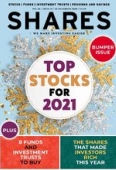Archived article
Please note that tax, investment, pension and ISA rules can change and the information and any views contained in this article may now be inaccurate.
The year Baillie Gifford took over the investing world

We all know the many things 2020 will be remembered for, but in the investment world it’s been a historic moment for the performance of Baillie Gifford’s investment funds.
It’s been the year many societal and economic trends have accelerated sharply, and this has fueled what some fund managers and analysts have called ‘extreme growth’ in certain parts of the stock market.
As arguably one of, if not the purest growth investment house in the UK, the way stock markets have performed this year could not have been any more suited to Baillie Gifford’s investment style.
HAVING MONEY IN THE RIGHT PLACE
The pandemic has seen the acceleration of many trends with home working, video calls and online shopping a part of our lives more than ever before, while the focus on a greener, cleaner environment and the importance of healthcare has become sharper than ever.
Baillie Gifford has been right across these trends through its funds and most of its top 10 holdings by position size – including Tesla, Amazon, Alibaba, Shopify, MercadoLibre, Spotify, Netflix and Google owner Alphabet – have seen their share prices rise dramatically in 2020.
Tesla has risen five-fold, Alibaba, Amazon, Netflix and Spotify have either doubled or close to it, and MercadoLibre and Shopify have more than trebled.
EYE ON THE LONGER TERM
Baillie Gifford has always maintained it is a long-term investor and doesn’t seek out companies just because they might have a particularly good 2020 or 2021 for example, and its stated aim is to find companies that can double their earnings in a five-year period.
The companies in which it invests may now be able to do that in the space of just one or two years thanks to the big shifts caused by the pandemic. And this is a key reason why many of Baillie Gifford’s funds and investment trusts have been top performers in their categories in 2020.
TOP OF THE FUND CHARTS
On the open-ended fund side some of the returns have been stellar. Thanks to the performance of the aforementioned shares Baillie Gifford American (0606196) for example has returned a staggering 123% year-to-date, a sector-beating performance which dwarfs the 16.7% return from the S&P 500.
Even in unloved categories like the UK it has at least managed to outperform with the popular Baillie Gifford UK Equity Alpha (0585819) returning 3.6%, better than the 9% decline in the FTSE All-Share and well inside the top quartile for funds in the sector.
While on the investment trust side the likes of Scottish Mortgage (SMT) and Edinburgh Worldwide (EWI) have this year delivered shareholders a return of 106% and 77% respectively.
Such performance is also one of the reasons why Baillie Gifford has won some big investment trust mandates this year, notably the popular Witan Pacific and Keystone (KIT) investment trusts, which have been renamed Baillie Gifford China Growth Trust (BGCG) and (from early 2021) Positive Change Investment Trust.
PEAK BAILLIE GIFFORD?
But it has also led market commentators to wonder whether we are at ‘peak Baillie Gifford’. Will its style of growth investing fall flat in 2021?
After all, it could be a year in which the widespread roll-out of coronavirus vaccines means economies start to reopen and discretionary spending increases markedly given the high level of consumer savings and pent-up demand that has accumulated this year. Cheaper value-style stocks could trump more expensive growth.
Should this turn out to be the case, growth in earnings won’t just be limited to a select few tech and healthcare stocks and will likely be seen across the board. The biggest increase could potentially come from stocks in the travel and leisure sector, an area which has been firmly in the value bucket in 2020, while financials and energy stocks could also do well in an economic recovery situation.
That in turn, at least in theory, could make the growth stocks that have done so well this year less appealing in 2021 as investors can pick up similar if not better levels of growth at a much cheaper price. That could suppress the share prices of the higher rated quality growth names that have done well over the past few years – at least relative to the wide market – and by extension negatively impact the performance of Baillie Gifford’s funds, none of which have a value tilt.
BAILLIE GIFFORD’S RESPONSE
The firm’s distribution and marketing director James Budden unsurprisingly sees this differently and dismisses the notion that next year will redefine the investment case for value stocks.
Budden tells Shares: ‘The idea that suddenly in 2021 oil is going to make a comeback, banks are going to become really structurally strong businesses again and that these companies are just going through a mispricing quite palpably is not true.
‘Everyone likes a bargain and these companies will have ups and downs, but [investing in value stocks] won’t be actual investing – it’s just trading.’
THE ‘ACTUAL INVESTING’ AGENDA
For the past few years Baillie Gifford has been pushing the idea of ‘actual investing’ as the key to driving long-term returns, arguing that the asset management industry generally has lost its way.
It defines ‘actual investing’ as deploying cash into tangible sustainable activities – like technological progress, medical breakthroughs or building better infrastructure – and allowing firms to grow and prosper over the long term.
It also stresses that ‘actual’ investment requires a willingness to be different, accept uncertainty and the possibility of being wrong.
TOO MUCH OVERLAP IN ITS FUNDS?
Besides the question mark over whether growth will still deliver better returns than value next year, it has also been pointed out that a lot of the top holdings in many Baillie Gifford funds feature the same stocks.
Scottish Mortgage, Baillie Gifford American and Baillie Gifford Positive Change (BYVGKV5) – which between them hold well over £20 billion of investors’ money – for example all have Tesla as the top holding, and the stock makes up between 9% and 10.8% of each fund.
An investor in all three would therefore be significantly exposed to fluctuations in Tesla’s share price.
When asked how Baillie Gifford defends against that perceived concentration risk, Budden insists each fund has strict risk parameters in place, highlights that between Scottish Mortgage and the Positive Change fund for example there is a crossover of just 21% to 22% maximum, and also rejects the idea in the first place that there is concentration risk.
He explains: ‘Each team on each fund makes their own decisions. Don’t think it’s a case of decisions coming from above saying “you must buy Amazon or you must buy Tesla”. It’s not a simple read-across.
‘At the end of the day markets are driven by small groups of exceptional companies. That’s what’s driven US markets, that’s what’s driven Chinese markets – just look at the performance of Alibaba, Tencent, Nio compared to the others. That’s the driver of market returns, and academic research points to this as well.
‘The idea you should be investing in lots of other companies to avoid risk or volatility against an index, or just for the sake of diversification, is quite bizarre.’
REAPING THE REWARDS
Given its stellar performance in 2020, it could perhaps be argued Baillie Gifford has got lucky this year with the conditions created by the pandemic just happening to suit its style.
But the company has held positions in the likes of Tesla and Amazon for many years, and so its outsized gains over the course of the year have been in the making for a long time. Famously a long-term investor, Baillie Gifford is now reaping the reward for sticking to its long-held convictions.
Important information:
These articles are provided by Shares magazine which is published by AJ Bell Media, a part of AJ Bell. Shares is not written by AJ Bell.
Shares is provided for your general information and use and is not a personal recommendation to invest. It is not intended to be relied upon by you in making or not making any investment decisions. The investments referred to in these articles will not be suitable for all investors. If in doubt please seek appropriate independent financial advice.
Investors acting on the information in these articles do so at their own risk and AJ Bell Media and its staff do not accept liability for losses suffered by investors as a result of their investment decisions.
Issue contents
Editor's View
Feature
First-time Investor
Great Ideas
- Stock pick for 2021: Alibaba
- Stock pick for 2021: Tracsis
- Stock pick for 2021: Eurofins Scientific
- Stock pick for 2021: JD Wetherspoon
- Stock pick for 2021: BHP
- Stock pick for 2021: Inspecs
- Stock pick for 2021: Convatec
- Stock pick for 2021: RWS
- Stock pick for 2021: PZ Cussons
- Stock pick for 2021: Diageo
- Stock pick for 2021: Qinetiq
- Stock pick for 2021: Ocado

 magazine
magazine











